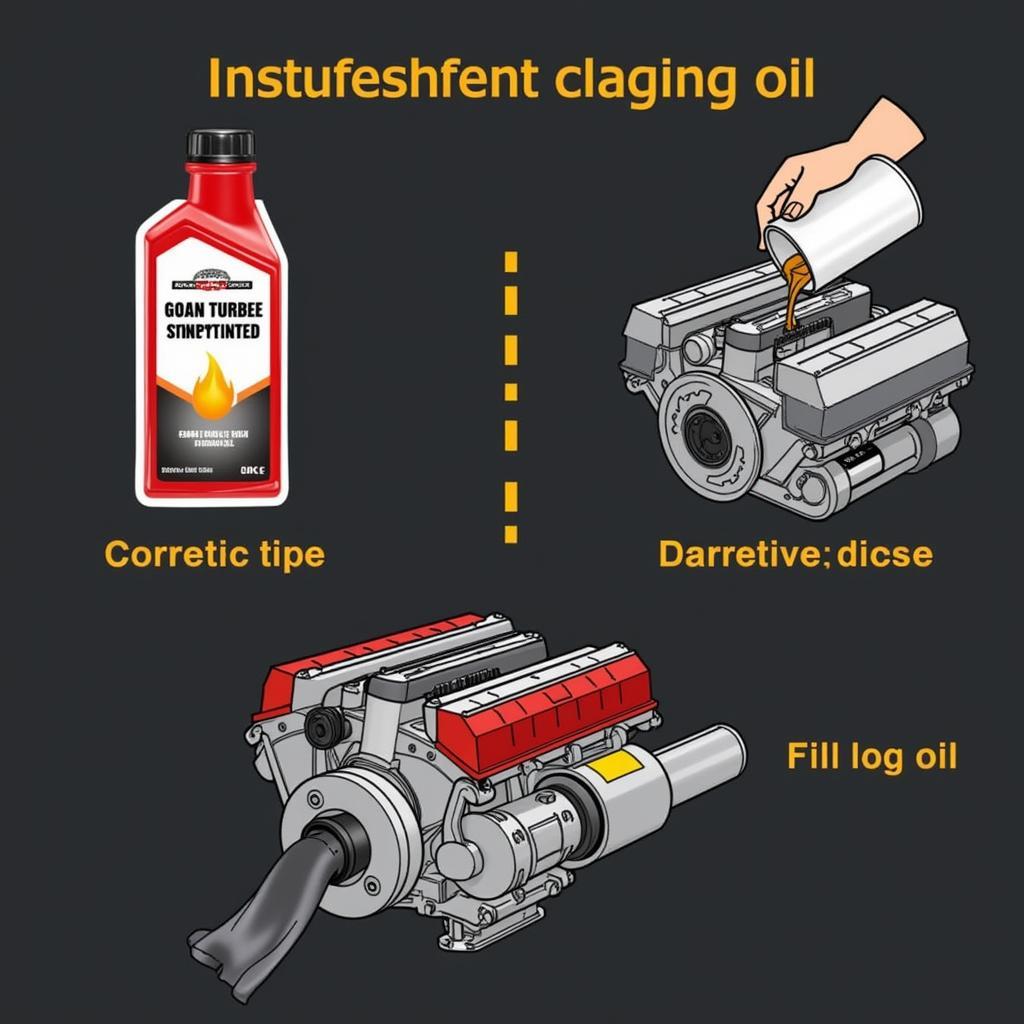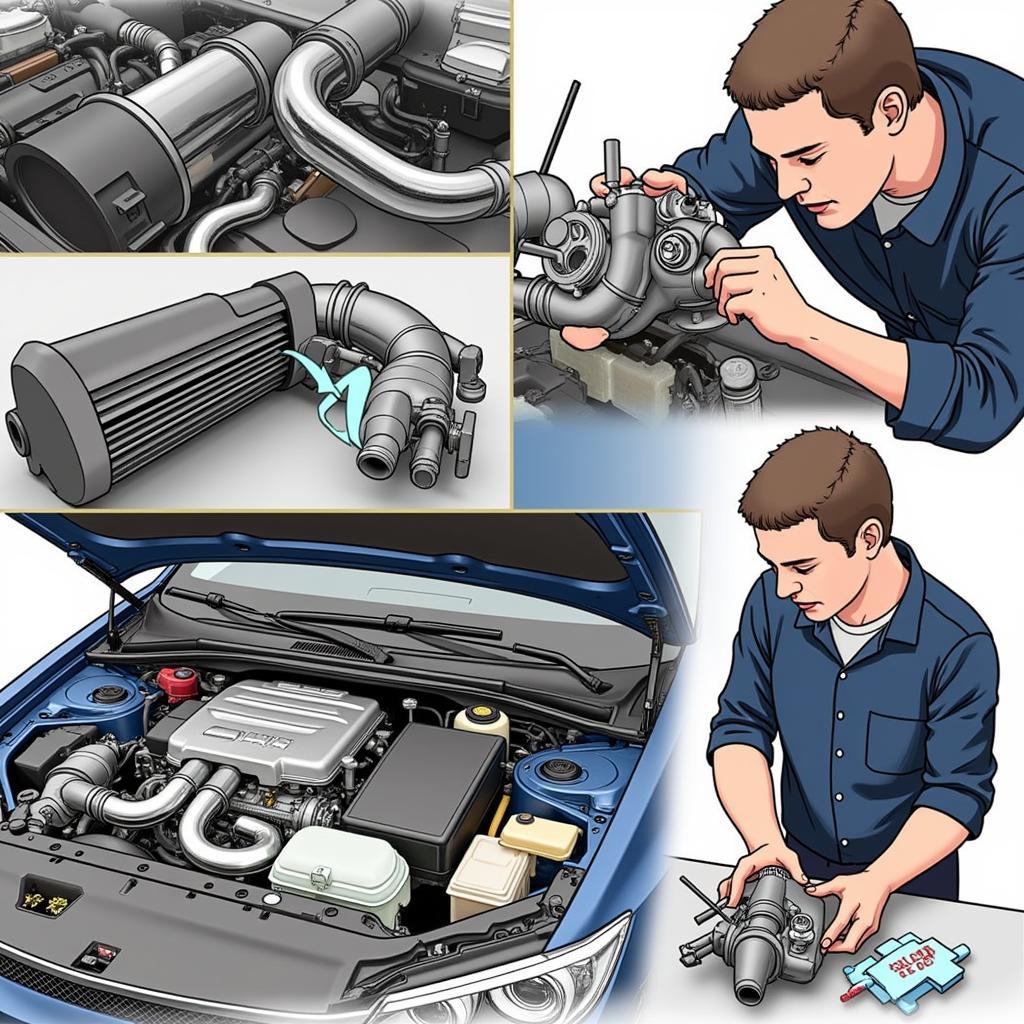Turbocharged cars offer exhilarating performance, but they demand specific care to maintain their longevity and efficiency. Proper turbo car maintenance is crucial to avoid costly repairs and ensure optimal performance. This guide offers practical tips for owners, mechanics, and technicians to keep their turbocharged vehicles in top condition.
Understanding the Importance of Turbo Car Maintenance
Turbochargers operate under extreme conditions, spinning at incredibly high speeds and exposed to intense heat. This makes regular maintenance even more critical than in naturally aspirated engines. Neglecting these vital checks can lead to premature wear and tear, reduced performance, and ultimately, turbo failure. Just like maintaining the right tire pressure or changing your oil regularly, turbo car maintenance is a crucial part of owning a turbocharged vehicle. Remember that preventative maintenance is always cheaper than major repairs.
Similar to things for car maintenance, turbo maintenance requires attention to detail. Early detection of potential issues can save you significant money and frustration in the long run. By following a few simple Turbo Car Maintenance Tips, you can keep your turbo spinning smoothly for years to come.
Essential Turbo Car Maintenance Tips
Here are some key turbo car maintenance tips that will help you maximize the life and performance of your turbocharger:
- Warm-up and Cool-down: Allowing your engine to warm up properly before putting strain on the turbo is crucial. Equally important is letting the engine idle for a minute or two after a hard drive to allow the turbocharger to cool down. This prevents the oil from overheating and coking within the turbo.
- Regular Oil Changes: Use high-quality synthetic oil specifically designed for turbocharged engines. Turbochargers rely on oil for lubrication and cooling. Regular oil changes, as recommended by your vehicle’s manufacturer, are vital for preventing oil contamination and sludge buildup, which can damage the turbo.
- Air Filter Maintenance: A clean air filter ensures that the turbo receives a consistent supply of clean air. A dirty filter restricts airflow, forcing the turbo to work harder and increasing the risk of damage. Regularly inspect and replace your air filter as needed.
- Check for Leaks: Regularly inspect for oil and coolant leaks around the turbocharger and its associated components. Leaks can indicate potential problems and should be addressed promptly.
- Inspect Intercooler and Piping: The intercooler and its associated piping are vital for cooling the compressed air before it enters the engine. Check for leaks, cracks, or loose connections that can compromise performance.
 Oil Change for Turbo Engine
Oil Change for Turbo Engine
Addressing Common Turbocharger Problems
Like any mechanical component, turbochargers can experience issues. Here are some common problems and how to address them:
- Unusual Noises: Whining, whistling, or grinding noises from the turbocharger can indicate a problem with the bearings or other internal components. These noises should be investigated by a qualified mechanic immediately.
- Loss of Power: A noticeable decrease in engine power can be a sign of a failing turbocharger. This could be due to a variety of issues, including worn bearings, damaged seals, or a cracked turbine housing.
- Excessive Smoke: Blue smoke from the exhaust can indicate oil burning within the turbocharger, while white smoke can suggest a coolant leak.
- Check Engine Light: If the check engine light illuminates, it’s crucial to have the vehicle diagnosed by a professional to identify the underlying issue.
This is similar to high mileage turbo car maintenance, where regular checks are essential to maintain performance and longevity. Addressing these issues promptly can prevent further damage and costly repairs.
 Checking for Leaks in a Turbo System
Checking for Leaks in a Turbo System
Turbo Car Maintenance: Frequently Asked Questions
Q: How often should I change the oil in my turbo car?
A: Follow the manufacturer’s recommended oil change intervals, typically every 5,000-7,500 miles for turbocharged engines.
Q: What type of oil is best for turbo cars?
A: High-quality synthetic oil specifically formulated for turbocharged engines is recommended.
Q: Can I install a turbocharger on any car?
A: Not all engines are suitable for turbocharging. Consult with a qualified mechanic to determine if your engine can handle the added stress of a turbocharger.
Q: How can I tell if my turbocharger is failing?
A: Common signs of a failing turbocharger include unusual noises, loss of power, excessive smoke, and the illumination of the check engine light.
Q: Is it necessary to let my turbo car idle after driving?
A: Yes, allowing the engine to idle for a minute or two after driving, especially after hard driving, allows the turbocharger to cool down and prevents oil coking.
As with reliable low maintenance luxury cars, proactive maintenance is key to avoiding major issues. Consistent attention to your turbocharged car’s needs will pay dividends in the long run.
Conclusion
Following these turbo car maintenance tips can significantly extend the life of your turbocharger and ensure optimal performance. Regular maintenance is not only cost-effective but also crucial for preventing major issues down the road. By understanding the specific needs of your turbocharged engine and following these guidelines, you can enjoy the thrill of boosted performance for years to come.
For further assistance with your turbo car maintenance, please connect with us. You can reach us at AutoTipPro at +1 (641) 206-8880 or visit our office at 500 N St Mary’s St, San Antonio, TX 78205, United States.




Leave a Reply